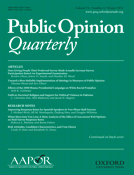-
Views
-
Cite
Cite
Cindy D. Kam, Elizabeth N. Simas, Risk Attitudes, Candidate Characteristics, and Vote Choice, Public Opinion Quarterly, Volume 76, Issue 4, Winter 2012, Pages 747–760, https://doi.org/10.1093/poq/nfs055
Close - Share Icon Share
Abstract
The act of voting is much like a gamble: Voters can never be certain about where candidates stand or what they will actually do once in office. In this note, we argue that there is theoretically interesting heterogeneity in risk attitudes among the mass public—heterogeneity that has important electoral consequences. We hypothesize that risk-averse voters will be drawn to candidates who offer certainty and stability, whereas risk-accepting voters will be more willing to support candidates characterized by uncertainty and change. Utilizing data from the 2008–2009 ANES Panel Study, we show that individual risk attitudes significantly influence support for challenger candidates in the 2008 U.S. House races. We then unpack this empirical relationship between risk attitudes and willingness to support challenger candidates using two additional data sets. These supplementary analyses suggest that the relationship between risk attitudes and willingness to support challengers may be partly attributable to the fact that challengers represent a departure from the status quo and typically have less governing experience. In short, challengers represent a gamble that the more risk accepting are more willing to take.





